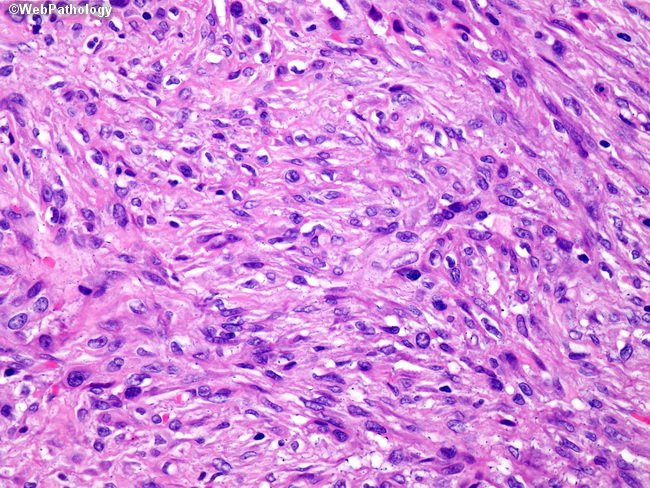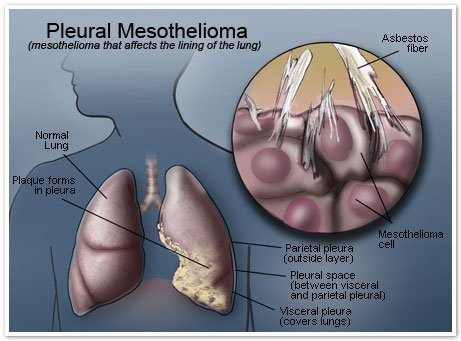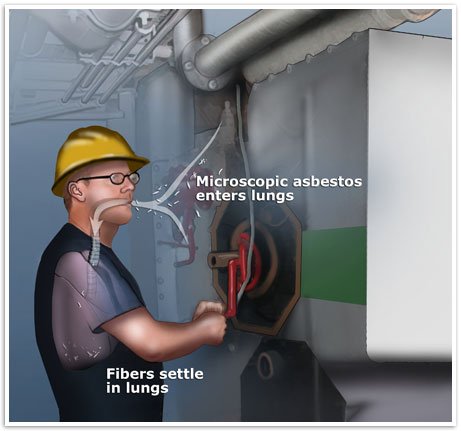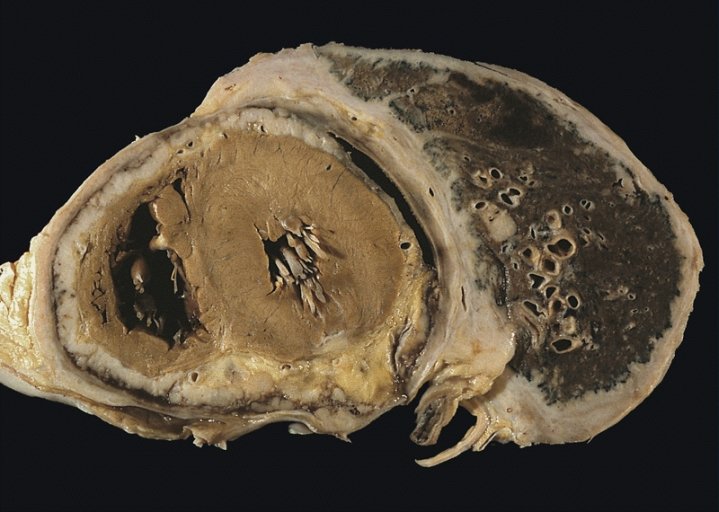What is Mesothelioma?
What is Mesothelioma? What is the survival rate for Mesothelioma? What knowledge do you need to know about this disease?
I. What is mesothelioma?
- Here we have the terms: tumor and mesothelioma.
- In terms of oncology, when mentioning the term tumor: we understand it as follows. This is the above-normal development of a group of cells in the body. That means: it can be benign or malignant (cancerous).
- Mesothelium: thin layer of tissue that covers most internal organs.
- So there are two cases: A completely benign tumor or Cancer of the tissue layer covering the organs.

Image of pleural cancer under a microscope
II. For benign tumors
- Mesothelioma patients can live with the tumor. The tumor does not metastasize, does not invade other organs, but only concentrates in one location.
- However, the trouble with them is that they sometimes grow large, compressing surrounding organs. For example, they can compress the pericardium, causing heart failure. Or compresses the lungs and bronchus, reducing respiratory volume. Fortunately, for these tumors, doctors simply need to perform surgery. After surgery, the patient does not need chemotherapy or radiotherapy.
III. For malignant tumors: Mesothelioma
- This is a cancer that occurs in the thin layer of tissue that covers most internal organs (mesothelium).
- Mesothelioma is a very malignant disease and leads to the death of cancer patients. Treatments are still being researched. Currently, treatment often focuses on helping the patient feel most comfortable.

IV. The cause to the illness:
- In general, cancer begins when a series of genetic mutations occur in cells that lead to cells growing and multiplying uncontrollably.
- There is still no definitive discovery as to the cause of mesothelioma. However, researchers have identified factors that may increase the risk.
- The interaction between many factors: genetics, environment, health conditions and lifestyle.
V. Risk factors leading to mesothelioma
Asbestos exposure:
- The main risk factor for mesothelioma is Asbestos – a mineral found in nature. Asbestos fibers are very durable and have good heat resistance. Products made from asbestos such as insulation, brakes, roofing, flooring…
- When asbestos is damaged (during mining, when removing insulation materials) it can create dust. If inhaled or swallowed, asbestos fibers will settle in the lungs or stomach. This can cause inflammation, leading to mesothelioma over time. Although the mechanism is still unclear.

- It can take 20 to 40 years or longer to develop into mesothelioma.
- Some people who have been exposed to asbestos for many years do not develop mesothelioma. But there are some people who have very little contact, and in a short period of time, they develop the disease. This shows that there are other factors involved in determining whether or not you get mesothelioma. For example, there may be a family member with cancer or some other medical condition that can increase the risk.
Radiation:
- Research shows: several factors link mesothelioma. Radioactive thorium dioxide is suspected. This is a substance used along with X-rays to diagnose diseases from the 1920s to the 1950s.
- The disease has also been treated with radiotherapy treatment. For example, in the chest, radiation therapy is used to treat breast cancer or lymphoma.
Family-genetic factors:
- Factors in family history of mesothelioma. Recognized increased risk of mesothelioma. But more research is needed to understand this theory.
BECAUSE. Techniques used to diagnose mesothelioma
When there is an unusual problem, you often go to a reputable medical facility for examination and diagnosis. Usually, when in doubt, doctors will conduct screening with the following tests:
Biopsy
- A procedure to remove a small portion of tissue for testing. This is the only way to determine if you have mesothelioma. Depending on the area of the body affected, doctors choose appropriate biopsy procedures.
Ways to take a mesothelioma biopsy sample include:
- Aspiration of fluid with a needle.
- Thoracoscopy – Cleaning and aspiration of bronchial fluid.
- Laparoscopy and abdominal biopsy techniques. The surgeon looks inside the patient’s abdomen. Using one or more small incisions in the abdomen, the surgeon inserts special surgical tools to remove a piece of tissue for testing.
- Thoracotomy: the surgeon opens the chest between the ribs. This method allows the surgeon to check for signs of disease. At the same time, they also took a tissue sample for testing.
- Laparotomy: allows the surgeon to check for signs of disease. Tissue sampling for testing is carried out at the same time.
Tissue samples are analyzed under a microscope:
- Determine whether the tissue sample is mesothelioma or not. Determine the type of mesothelioma to determine your treatment plan.
VII. Stages of mesothelioma
Once mesothelioma has been diagnosed, your doctor will order other tests to determine the extent and stage of the cancer.

Image of pleural cancer on autopsy
Imaging tests that help determine the stage of your cancer include:
- Computed tomography (CT scan) of the chest and abdomen
- Magnetic resonance imaging (MRI)
- Positron emission tomography (PET)
VIII. Stages of mesothelioma
For confirmed pleural carcinoma, the stages of the cancer are classified as follows:
- G. stage I – mesothelioma is considered a localized cancer, meaning it is limited to one part of the lining of the chest.
- Stage II – mesothelioma may have spread beyond the lining of the chest to the diaphragm or lungs.
- Stage III – mesothelioma may have spread to other structures in the chest and may have spread to nearby lymph nodes.
- Stage IV – mesothelioma is an advanced cancer that has now spread within the chest. Stage IV can also mean that the mesothelioma has spread to distant areas of the body such as the brain, liver, and lymph nodes anywhere in the chest.
Stages have not been classified for other types of mesothelioma because they are rare and have not been studied.
IX. Treatment methods:
Surgery
- Aims to eliminate mesothelioma when it is diagnosed at an early stage. In some cases, surgery can completely cure the cancer.
- Sometimes, surgery cannot remove all of the cancer. In many cases, surgery helps relieve signs and symptoms.
- Surgery to remove as much cancer as possible. If all of the cancer cannot be removed, the surgeon will try to remove as much as possible. This method helps doctors administer radiation treatment more accurately. It also relieves pain and reduces fluid buildup caused by mesothelioma.
Valence
- That is using chemicals to kill cancer cells. Systemic chemotherapy goes throughout the body.
- Effects: shrinks or slows the growth of tumors that cannot be removed by surgery.
- Chemotherapy may also be used before surgery (adjuvant chemotherapy). That makes it easier to have surgery or chemotherapy after surgery to reduce the risk of the cancer recurring.
Radiotherapy
- A method of focusing high-energy beams from sources such as gramma and proton beams. The projection focuses on a specific place or point on the body.
- Radiation therapy may be used after surgery to destroy remaining cancer cells. It may also help reduce signs and symptoms of advanced cancer in cases where surgery is not possible.
X. Development directions of the fight against mesothelioma
- Clinical trials are new mesothelioma treatments being studied.
- People with mesothelioma can choose a clinical trial to get a chance to try new treatments. However, these tests do not guarantee success. Carefully consider your treatment options and talk to your doctor about what new clinical trials are for you. Your participation in a clinical trial helps doctors better understand how to treat mesothelioma in the future.
Clinical trials are underway with several new approaches, including:
- Targeted drug therapy involves using drugs that attack specific errors in cancer cells.
- Biological therapy uses the body’s immune system to fight cancer.
- Gene therapy involves changing genes inside cancer cells to stop the disease.
Treatment of other types of mesothelioma
- Pericardial cancer and testicular cancer are very rare. Early-stage cancer can be removed with surgery. Doctors have not yet found a way to treat late-stage cancer. Your doctor may recommend other treatments to improve your quality of life.
XI. These living habits help you limit the progression of the disease:
The following lifestyle and home remedies can help you deal with mesothelioma:
- Learn enough about mesothelioma to make informed decisions about your care. Prepare questions to ask your doctor.
- Have a support network. Friends and family can help you with everyday tasks like making medical or treatment appointments. Learn to be honest with yourself and accept help when needed.
- Plan ahead. Orientation helps your family carry out your wishes in case you are no longer able to make your own decisions.
